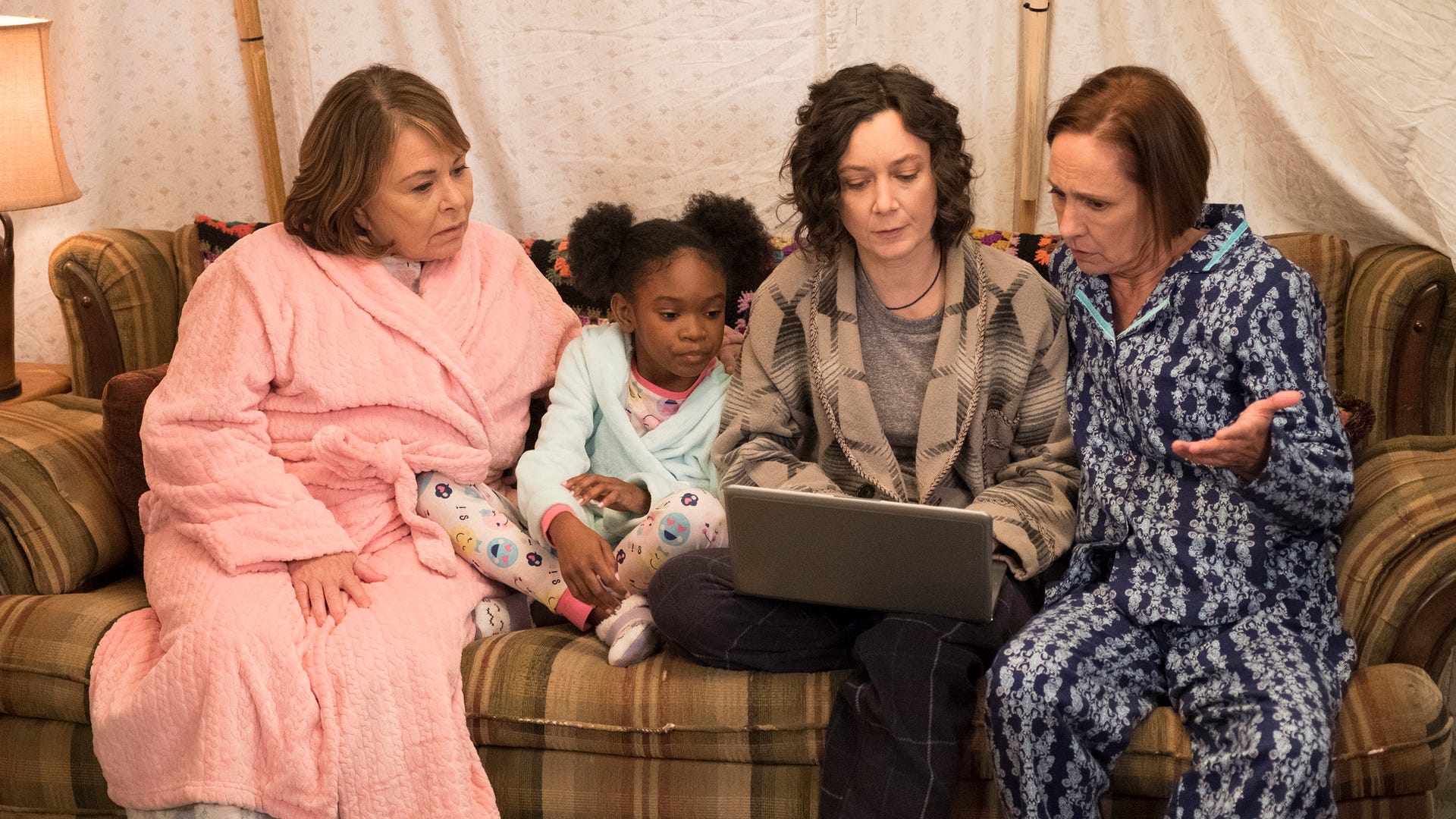Join or Sign In
Sign in to customize your TV listings
By joining TV Guide, you agree to our Terms of Use and acknowledge the data practices in our Privacy Policy.
No Snub Here: Roseanne Didn't Deserve an Emmy Nomination
Why Roseanne should be used to sitting on the sidelines
Even if Roseanne Barr hadn't posted that nuclear tweet, let's be real: Roseanne wasn't getting an Emmy nomination for Outstanding Comedy Series. It's how it's always been and how it shall remain. (Laurie Metcalf was the sole Roseanne nominee in the major categories, for Outstanding Supporting Actress in a Comedy Series; the show was also nominated for a Creative Arts Emmy for editing.)
In its original 1998 to 1996 run, Roseanne did win four Emmys -- but those were all awarded for acting accolades, not writing or overall categories. Back in the day, the Television Academy overlooked Roseanne in favor of snootier shows like Murphy Brown and Frasier, which felt like proof to its creator and viewers that Hollywood would forever dismiss "real Americans" for coastal elites. That's part of why Roseanne, with its dingy couch and unflinching looks at working-class struggles, felt like a revolution. With impactful episodes like "White Men Can't Kiss," in which DJ (Michael Fishman) wouldn't kiss a black girl, or "Crime and Punishment," when Dan kicked Fisher's (Matt Roth) ass for abusing Jackie (Laurie Metcalf), Roseanne frankly deserved some nominations in its first run.
Emmys 2018: See the Full List of Nominees Here
Roseanne's equity is what led Whitney Cummings, producer of Roseanne 2.0, to take the job: she told TV Guide that she hoped that a compassionate portrait of the Conner family would help viewers see our shared commonalities instead of differences. It was a noble, perilous mission. But the revival was never going to get an Emmy nomination for Best Comedy, in part because it could never recapture the revolutionary edge of the original.
Culture, technology and the media business change by the minute. And although The Television Academy's 20,000-plus Emmy voters still have love for broadcast TV, all that innovation, opportunity and uncertainty impacts what's on screen. Two of this year's Best Comedy nominees come from streaming platforms -- The Marvelous Mrs. Maiselon Amazon and GLOW on Netflix -- and two others, Barry and likely winner Atlanta, are part of a thrilling disruption in the way stories are told on cable. Yes, other frontrunners Will & Grace(one Best Comedy win out of 16, not nominated this year) and black-ish (zero wins; eight noms, including one this year) put gay and black people, respectively, into the spotlight but diversity alone didn't land them recognition; they're well-written shows with strong actors and these shows take risks, like black-ish's "Juneteenth" episode, that keep things unpredictable.
Roseanne, by contrast, had significant problems in its reboot, starting with the premise that seemed more engineered to cause intrigue and shock rather than the conversation of eras past. So, Roseanne Conner is a Trump supporter -- OK, fine. But facing a health crisis with no insurance and an addiction to opioids, Mrs. Conner never was able to articulate why she supported the candidate who's failed to fix either crisis. Mrs. Conner's politics, which everybody had been so hyped to at least see play out, just sort of fizzled after the first episode instead of becoming the talking point it could've been. Poor Jackie, who gave Roseanne three of its four Emmys (supporting comedy actress 1992-1994; Barr got the other one for best lead in 1994), seemed constantly undone for no reason and underused.
Roseanne's last two episodes, particularly its lovely and emotional finale, rang with the promise of better days but in totality, the reboot felt like a bunch of ideas shoehorned into an old concept revived for the sole purpose of cashing in on a trend. Which, hey, no judgment; everyone else is doing it after all. But its biggest creative gamble was that joke that fell horribly flat; you can't be the underdog, after all, if you're part of the current political majority. Populist appeal isn't enough to earn a seat inside the Microsoft Theater alongside all that sexier, more adventurous TV -- particularly when most of it is designed to expand empathy and representation for more types of people rather than clamp down on it as Grandma Rosey seemed to prefer.

Roseanne Barr, Jayden Rey, Sara Gilber, Laurie Metcalf, Roseanne
Adam Rose, ABC
And then there's that tweet itself. It was cruel, it was unnecessary, and whether Barr knew it or not, its correlation of a black person with an ape reeked of hateful, dehumanizing prejudice that neither ABC or Barr's colleagues could abide by. Why ABC overlooked Barr's history of these kinds of sentiments, or at the very least neglected to seize her phone in the first place, will remain a mystery, but nevertheless, it was bad for business. It's bad branding. The Emmys, already treading water to keep afloat with younger, multicultural consumers who could be watching umpteen million other things, needs to align with a toxic figure as much as it needs to broadcast on Jupiter.
The Emmys honor the highest achievements in creativity, storytelling, hard work and technical skill, but they're also a gold standard of what culture deems important in the moment -- a night to celebrate the best humans can do with this incredible medium. Roseanne's comeback wasn't even close, and the layers of grief its offscreen implosion conjures up weren't worth the cost either.
